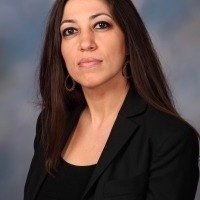
Seval Yildirim
University at Buffalo, State University of New York, Law, Professor of Law and Vice Provost for Inclusive Excellence
Seval Yildirim is a Professor of Law, and UB’s Vice Provost for Inclusive Excellence and Chief Diversity Officer. A scholar of law and religion, Professor Yildirim also has extensive administrative experience in higher education, including in areas of diversity, equity, and inclusion, faculty and student recruitment and retention, promoting inclusive pedagogy and classrooms, community outreach and fundraising.
Professor Yildirim’s research and expertise center on issues related to human dignity, secularism in comparative contexts, Muslim identity and the law, populism and free speech. Her current research explores patterns and formations of populism in comparative contexts, as well as the diminishing scope of free speech protections in the United States. Her scholarship has been published in various journals and edited volumes, including the American Journal of Comparative Law, Pepperdine Law Review and Minnesota Journal of International Law.
Prior to UB, Professor Yildirim served as Vice President for Diversity Initiatives and Chief Diversity Officer at the University of Nevada, Las Vegas, and Associate Provost for Faculty Affairs and Development and Co-Chief Diversity Officer at California State University, San Bernardino. Before her senior leadership roles, Professor Yildirim held various positions as either faculty or visitor, including at Harvard Law School, University of California Berkeley School of Law, Villanova University School of Law and New York University.
In addition to her academic and administrative positions, Professor Yildirim has served as pro bono counsel and legal consultant on individual rights cases across the United States, working with various grassroots organizations, including the American Civil Liberties Union.
Professor Yildirim holds a JD and LLM from New York University School of Law, an MA in International Affairs from George Washington University and a BA in Politics and Women’s Studies from Randolph-Macon Woman's College.
Professor Yildirim’s research and expertise center on issues related to human dignity, secularism in comparative contexts, Muslim identity and the law, populism and free speech. Her current research explores patterns and formations of populism in comparative contexts, as well as the diminishing scope of free speech protections in the United States. Her scholarship has been published in various journals and edited volumes, including the American Journal of Comparative Law, Pepperdine Law Review and Minnesota Journal of International Law.
Prior to UB, Professor Yildirim served as Vice President for Diversity Initiatives and Chief Diversity Officer at the University of Nevada, Las Vegas, and Associate Provost for Faculty Affairs and Development and Co-Chief Diversity Officer at California State University, San Bernardino. Before her senior leadership roles, Professor Yildirim held various positions as either faculty or visitor, including at Harvard Law School, University of California Berkeley School of Law, Villanova University School of Law and New York University.
In addition to her academic and administrative positions, Professor Yildirim has served as pro bono counsel and legal consultant on individual rights cases across the United States, working with various grassroots organizations, including the American Civil Liberties Union.
Professor Yildirim holds a JD and LLM from New York University School of Law, an MA in International Affairs from George Washington University and a BA in Politics and Women’s Studies from Randolph-Macon Woman's College.
less
Related Authors
Thomas W Smith
University of South Florida
Talip Kucukcan
Marmara University
Laçin İdil ÖZTIĞ
Yildiz Technical University
Dolunay Bulut
University of Arizona
Ozan Varol
Lewis & Clark College
Cemil Boyraz
Istanbul Bilgi University
Hasret Dikici Bilgin
Istanbul Bilgi University
InterestsView All (13)








Uploads
Papers by Seval Yildirim
The article discusses commonly used concepts relevant to secularism in general and argues for the need to distinguish between the secular, secularism, and secularization as a governance project. Through a historical survey of military interventions in the political process and judicial construction of secularism, the article discusses the development of state-religion relationship from the Ottoman Empire to modern day Turkey. The surveyed events of the republican era highlight the brutal and militant nature of the secularization project, followed by the populist response in the form of over two decades of electoral victories by the Adalet ve Kalkinma Partisi (Justice and Development Party) (“AKP”) whose governance project has led to a radical reformulation of Turkish secularism.
The article also argues that even though pious populations were marginalized during the decades of militant secularization, the current shifts to a populist secularism have created new marginalized and excluded identities, including religious and ethnic minorities, LGBTQ+ populations, as well as increasing threats to gender equality and equity.
The article discusses commonly used concepts relevant to secularism in general and argues for the need to distinguish between the secular, secularism, and secularization as a governance project. Through a historical survey of military interventions in the political process and judicial construction of secularism, the article discusses the development of state-religion relationship from the Ottoman Empire to modern day Turkey. The surveyed events of the republican era highlight the brutal and militant nature of the secularization project, followed by the populist response in the form of over two decades of electoral victories by the Adalet ve Kalkinma Partisi (Justice and Development Party) (“AKP”) whose governance project has led to a radical reformulation of Turkish secularism.
The article also argues that even though pious populations were marginalized during the decades of militant secularization, the current shifts to a populist secularism have created new marginalized and excluded identities, including religious and ethnic minorities, LGBTQ+ populations, as well as increasing threats to gender equality and equity.